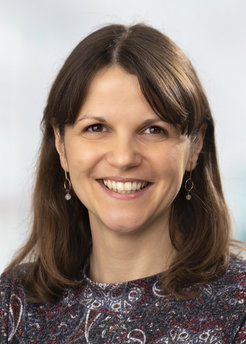ERC Consolidator Grant for Nina Cabezas-Wallscheid
On the way to the perfect diet for a healthy ageing of stem cells
The European Research Council (ERC) has awarded Nina Cabezas-Wallscheid a prestigious ERC Consolidator Grant for her project “NutriSTEM”. The Freiburg-based Max Planck researcher is investigating the regulation of hematopoietic stem cell (HSC) dormancy and how metabolic products such as vitamins or other dietary components influence the ability of this rare cell type to form new blood cells.

The body produces billions of new blood cells every day to fight disease, remove damaged cells and compensate for blood loss. A key player in blood formation, especially under stress conditions, are hematopoietic stem cells (HSCs), which reside in a dormant state deep in niches of the bone marrow. This dormant state preserves their capability to make new blood cells and to regenerate over the long-term.
As people age, more and more of these blood stem cells lose their ability to form new cells, leading to an imbalance in blood production. This is where Nina Cabezas-Wallscheid’s project comes in. Her laboratory’s research has already shown that certain metabolites are not only part of metabolic pathways but can also act as signals for cellular processes. “For example, we were able to show that vitamin A can maintain the dormant state of HSCs through epigenetic and transcriptional changes,” explains Nina Cabezas-Wallscheid.
The ERC-funded NutriSTEM project, which has received a €2 million grant, aims to gain in-depth insights into how metabolic products derived from food or produced by the body regulate HSCs. “We aim to assess the effects of widely consumed dietary components, such as caffeine or curcumin, on HSCs and the overall hematopoietic system, as their impact has not been studied,” explains Nina Cabezas-Wallscheid. “This is particularly important since the long-term consequences of consuming specific dietary components on HSCs are largely unknown and may influence their healthy -or unhealthy- ageing.”
The interdisciplinary project aims to develop new analytical techniques for single-cell metabolomics of HSCs and spatial metabolomics of the bone marrow niche. The ultimate aim is to identify the perfect diet plan for HSCs by studying how different metabolites influence their behavior and ageing. The results could not only change general dietary recommendations, but also open up new therapeutic ways of preventing leukemia and the effects of physiological ageing.
About Nina Cabezas-Wallscheid
Nina Cabezas-Wallscheid studied biotechnology (MSc) at the Autonomous University of Barcelona, Spain, and the University of Parma, Italy. She earned a Ph.D. in the study of AML1-ETO, a subtype of acute myeloid leukemia (AML), at the University Medical Center of the Johannes Gutenberg University of Mainz, Germany, under the supervision of Ernesto Bockamp. There, Nina Cabezas-Wallscheid showed the evolution of transcriptional landscapes and the establishment of cancer stem cell hierarchies based on a novel mouse model. During her Ph.D., she also visited the laboratory of David Scadden as a guest scientist at the Harvard Stem Cell Institute in Boston, USA. Nina Cabezas-Wallscheid performed her postdoctoral fellowship in the Division of Stem Cells and Cancer under the mentorship of Andreas Trumpp at the German Cancer Research Center (DKFZ) in Heidelberg, Germany. There, she focused on identifying regulatory networks in the adult HSC and multipotent compartment and investigating factors controlling HSC dormancy. In 2017, Nina Cabezas-Wallscheid was appointed as group leader at Freiburg’s Max Planck Institute of Immunobiology and Epigenetics. In 2023, she was appointed as Full Professor of Stem Cell Biology and Ageing at the Department of Health Sciences and Technology at ETH Zurich, Switzerland.
Nina Cabezas-Wallscheid is a renowned researcher who has received several prestigious awards and grants. In 2017, she was supported by the European Research Council (ERC) through a highly competitive Starting Grant. She was also honored with the 2018 Young Investigator Award by the German Stem Cell Network (GSCN), became an EMBO Young Investigator in 2022, and, more recently, was awarded the 2023 Janet Rowley Prize by the International Society for Experimental Hematology (ISEH). In addition, Nina Cabezas-Wallscheid actively participates in several research consortia, such as the Cluster of Excellence CIBSS at the University of Freiburg, various Collaborative Research Consortia’s funded by the DFG (CRC992, CRC1425, CRC1479), MeInBio (RTG2344) and ARCH (H2020-MSCA-ITN) and is also funded by the José Carreras Foundation (2018 and 2022).
ERC Consolidator Grants
The European Research Council (ERC), established by the EU in 2007, is the leading European institution for promoting outstanding pioneering research. It supports creative researchers of all nationalities and age groups who conduct projects in Europe. The ERC offers four main funding programs: Starting Grants, Consolidator Grants, Advanced Grants, and Synergy Grants. The Consolidator Grants are among the most highly endowed funding measures of the EU and are awarded annually to scientists who have demonstrated outstanding achievements. This award is given to researchers from around the world who are active at European research institutions and have completed their PhD between seven and twelve years ago.
🇨🇭 SERI-funded ERC Consolidator Grants
NutriSTEM is set to start at the ETH Zürich in 2025. The State Secretariat for Education, Research and Innovation (SERI) of Switzerland has directly funded the NutriSTEM ERC Consolidator Grant as a transitional measure, given that Switzerland was not receiving funding from the European Commission until recently. More details.












